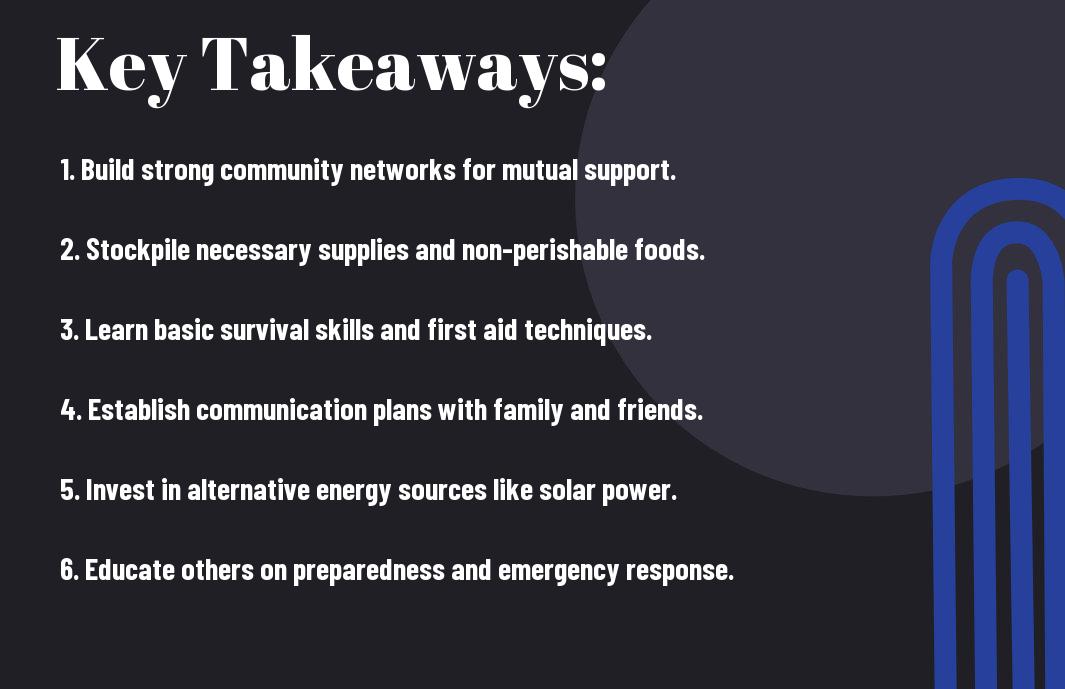You have the power to secure your community’s well-being during a grid-down crisis. This guide is designed to equip you with necessary strategies and resources to effectively navigate potential blackout situations. Understanding the unique challenges you may face is key to fostering resilience and self-sufficiency. From sustainable food sources to effective communication methods, this post will provide practical tips that empower you to build a robust emergency plan tailored to your needs. Together, you can enhance your community’s preparedness and create a supportive network in times of need.
Key Takeaways:
- Community Networking: Building strong connections within the community can enhance resource sharing and support during a crisis.
- Self-Sufficiency Skills: Developing vital skills such as gardening, cooking, and first aid can empower individuals to be less reliant on external resources.
- Emergency Preparedness Kits: Assembling well-stocked emergency kits that include food, water, and medical supplies is vital for survival during a grid-down situation.

Understanding Grid-Down Crises
A grid-down crisis occurs when the electrical power grid is disrupted or entirely non-functional, leading to widespread outages. This scenario can result from natural disasters, cyberattacks, infrastructure failures, or other emergencies. Preparing for such an event is vital for you and your community, as it can affect not only your daily life but also your access to critical resources and services.
Definitions and Causes
Any unanticipated event that causes a failure in the electrical grid can lead to a grid-down crisis. These causes may range from extreme weather and natural disasters to deliberate attacks on critical infrastructure. Understanding these causes enables you to better prepare for the risks associated with electrical system failures.
Potential Impacts on the Community
Across your community, a grid-down crisis can disrupt not only daily routines but also vital services such as food distribution, medical care, and communication systems. Without electricity, many businesses and services may shut down, creating significant challenges, especially for those who rely on technology and power for their livelihoods.
Also, the impacts of a grid-down crisis can exacerbate existing inequalities, disproportionately affecting low-income families and marginalized groups. Access to water, food, and healthcare can be severely limited, while the potential for increased crime rates may rise as social order breaks down. It is vital for you and your community to recognize these risks and take proactive steps toward self-sufficiency and resilience during such unpredictable events.
Essential Preparedness Strategies
It is vital to have a range of preparedness strategies in place as you navigate potential grid-down crises. These strategies should encompass basic survival skills, food and water storage, and the development of communication plans with your community. By proactively preparing and educating yourself, you can enhance your resilience and ensure that you and your loved ones are protected in emergencies.
Developing a Family Emergency Plan
For your family to successfully respond to a crisis, it is imperative to create a comprehensive emergency plan. This plan should outline communication methods, meeting points, and strategies for various emergencies. By involving each family member in the planning process, you foster a sense of responsibility while ensuring everyone understands their role in maintaining safety and security.
Building a Community Support Network
For effective crisis management, building a strong community support network is imperative. This network enables resource sharing, skill exchanges, and mutual assistance, making it easier for you to navigate challenging situations together.
In addition, a robust community support network helps you develop relationships with neighbors and local organizations, ensuring that you have access to diverse skills and resources. Engaging in local gatherings and workshops will allow you to connect with like-minded individuals who are committed to preparedness. Collaborative efforts, such as group trainings, can enhance everyone’s skills and foster a sense of solidarity, making your community more resilient in the face of adversity.
Food and Water Security
Many in the Black community can enhance food and water security by cultivating a self-sufficient lifestyle. This involves learning to grow your own food, foraging, and understanding food preservation techniques. By establishing strong food systems within your community, you can reduce dependency on external sources during challenging times, ensuring that you and your family have access to nourishing sustenance when it matters the most.
Sustainable Food Sources
Sustainable food sources are vital for long-term food security. You can consider planting a community garden, participating in local farmer’s markets, or even raising small livestock. By creating a network of trusted suppliers and growing your own food, you empower yourself and your community to thrive independently, thus fostering resilience against potential disruptions to food supply chains.
Water Filtration and Storage Solutions
Security in water access is important during a grid-down crisis. You should invest in water filtration systems and ensure you have adequate storage containers to hold clean water for your household. Understanding local water sources and their potential risks allows you to better prepare for unexpected shortages, ultimately leading to a safer, more reliable water supply.
This preparation involves assessing your current water supply and identifying filtration methods such as ceramic filters, UV treatment, or chemical disinfection to ensure clean drinking water. Additionally, consider storing large-capacity containers in a cool, dark place to extend the shelf life of pre-filtered water. Regularly rotate and maintain your stored water supply, and explore rainwater collection systems to diversify your resources. By prioritizing these water solutions, you fortify your household against potential contamination and shortages.
Health and Medical Preparedness
After a grid-down crisis, your access to necessary healthcare may be limited. Preparing for this scenario means understanding how to manage your health effectively. Prioritizing medical preparedness is vital; gather knowledge about basic health practices and be equipped with necessities to maintain well-being during challenging times. From first aid to chronic illness management, consider the steps you can take today to ensure your health remains a priority when resources become scarce.
First Aid Kits and Medical Supplies
To effectively handle potential injuries or illnesses during a crisis, tailor your first aid kit to your specific needs. Include necessary items like antiseptics, bandages, pain relief medication, and any over-the-counter supplies that would assist in treating common ailments. Consider adding prescription medications if applicable, and remember to check your kit regularly to ensure all supplies remain in good condition and replenish them as needed.
Managing Chronic Conditions
Beside ensuring you have adequate first aid supplies, it’s vital to address how you can manage any chronic conditions you may have. This includes developing a comprehensive plan that incorporates medication management, lifestyle adjustments, and alternative therapies if necessary. Making these preparations is key to maintaining your health when conventional medical facilities are unavailable.
Medical professionals emphasize the importance of having an actionable plan for managing chronic conditions during a crisis. Start by keeping a detailed list of your medications, their dosages, and refill schedules. Consider stocking up on long-term prescriptions where possible, and research alternative therapies that may be accessible. Additionally, maintaining a healthy lifestyle through proper nutrition and exercise can help in managing symptoms. Engage with your healthcare provider to discuss strategies tailored to your unique needs, ensuring that you remain prepared for unforeseen circumstances.

Safety and Defense Measures
Now is the time to assess and implement safety and defense measures to protect yourself and your community during a grid-down crisis. This involves not only securing your home but also developing personal safety strategies to ensure you and your loved ones remain safe and prepared for any unexpected situations that may arise.
Home Security Enhancements
Enhancements to your home security can significantly increase your safety during a crisis. Consider installing reinforced doors and deadbolt locks, fortifying windows with security screens, and using outdoor lighting to deter intruders. Implementing a neighborhood watch program can also create a sense of community vigilance, allowing you and your neighbors to protect each other more effectively.
Personal Safety Strategies
Measures you can take for personal safety include developing a communication plan with your family, carrying emergency tools, and practicing situational awareness when out in public. Ensure that every family member knows how to reach each other in case of separation, and keep necessary items like pepper spray or a whistle on hand to signal for help if needed.
Another effective way to enhance your personal safety is to participate in self-defense classes. These classes not only teach you physical techniques to protect yourself, but they also help build your confidence in navigating uncertain situations. Additionally, staying informed about your surroundings and potential threats can significantly elevate your readiness and response capabilities as events unfold.
Communication and Information Sharing
To effectively prepare for a grid-down crisis, you must develop strong communication and information sharing strategies. Establishing clear lines of communication within your community is vital, enabling you to share valuable updates, seek assistance, and coordinate preparedness activities. The more informed each member is, the better your community can respond collectively in times of uncertainty.
Establishing Communication Channels
Sharing information through various platforms is important for effective communication during a crisis. Utilize tools like group messaging apps, social media, or community bulletins to set up reliable channels. Make sure everyone in your network knows how to access and use these channels to stay connected, enabling swift dissemination of critical updates and resources.
Importance of Local Alerts and Updates
Against the backdrop of a grid-down situation, having access to local alerts and updates can significantly enhance your preparedness efforts. Regularly monitoring local news sources, social media, and community messaging systems will keep you informed about emergencies, safety advisories, and important services that may be affected. This ongoing awareness helps you make informed decisions for yourself and your family.
Communication is the backbone of effective preparedness. By staying informed through local alerts, you can anticipate potential challenges and adapt your plans accordingly. Community members can share alerts related to resource availability, safety measures, and support networks, ensuring that everyone remains safe and resourceful during a grid-down crisis. Building a community that prioritizes real-time information sharing will empower you and your neighbors to act quickly and efficiently when needed.
Summing up
With these considerations, you can effectively prepare your community for a grid-down crisis. Focus on building strong networks, stockpiling vital resources, and developing practical survival skills. Engage in proactive planning by assessing your needs and establishing communication plans. By prioritizing education, self-sufficiency, and community cohesion, you enhance your resilience and ensure that you and your loved ones are well-equipped to face any challenges that may arise. Your preparedness not only strengthens your household but also uplifts those around you, fostering a united and capable community.
Q: What are the first steps the Black community should take to prepare for a grid-down crisis?
A: The first steps involve developing a comprehensive emergency plan. Families should discuss and establish roles and responsibilities for all members. Creating an inventory of supplies, such as water, non-perishable food, first aid kits, and important medications is key. Additionally, identifying local resources like community centers or faith-based organizations that can provide support during a crisis can enhance collective preparedness.
Q: How can community organizations play a role in preparation efforts for a grid-down scenario?
A: Community organizations can be instrumental in organizing workshops and drills focused on emergency preparedness. They can facilitate training sessions on important skills, such as first aid, food preservation, and self-defense. Additionally, these groups can work towards advocating for better local infrastructure and resources, ensuring there is a system in place to support vulnerable populations during emergencies.
Q: What strategies are effective for building resilience within the Black community in the face of a grid-down crisis?
A: Building resilience involves fostering strong community networks that emphasize sharing skills and resources. Encouraging local farming and growing food in community gardens can reduce dependency on grocery stores, especially during supply chain disruptions. Establishing communication channels through social media or dedicated community apps can keep individuals informed about resources or services available during emergencies. Finally, emphasizing cultural practices and support systems can strengthen ties and create a united approach to surviving challenges.








